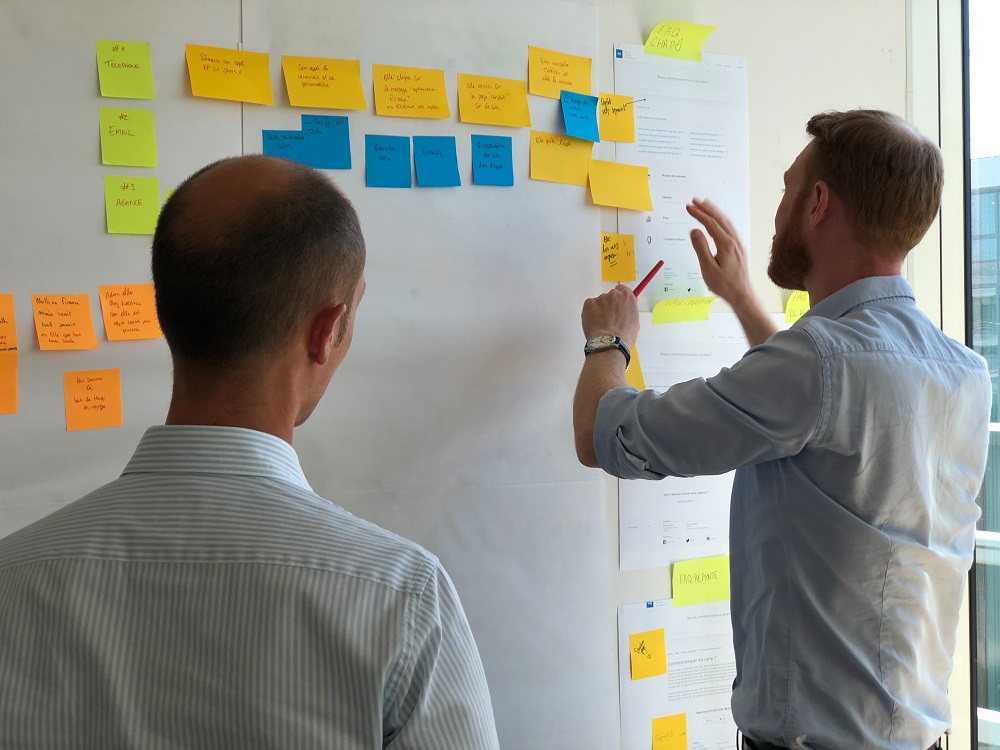Project Management web resources are awash with articles about 2020 project management trends. Almost on every page, they write about AI in PM, the increased significance of soft skills and emotional intelligence, and hybrid frameworks in project management as a new tendency. Practically, some of them are a little perverted, and some of them – exaggerated. Go on reading to get what we mean.
Artificial Intelligence in Project Management: Trend or Exaggeration?

The fact that AI as a project management trend in 2020 is discussed so vividly doesn’t make it true. The reality is as follows: no artificial intelligence exists in this field yet. There’s no doubt that most PM software solutions are based on specially designed algorithms that aim to automate such actions as planning, scheduling, resource allocation, but these mechanisms are not the result of artificial intelligence. Which is why we’re speaking of exaggeration in this context.
In his book titled “Applying Artificial Intelligence to Project Management”, Canadian professor Paul Boudreau warns readers not to be confused and misled by the popular term of artificial intelligence. The author claims that the automated procedures we’ve been dealing with in project management is machine learning, and it can’t be called AI. The difference between ML and AI is that the latter is driven by cognitive capability and can make complex decisions and perform predictions instead of simple repetitive actions just like your coffee machine makes hundreds of times every day. So, can you speak about artificial intelligence in project management if you still control all the related processes and make important decisions by yourself?
AI Forecast
Epicflow creators have been dedicating a great deal of time and energy investigating AI in PM for years. Moreover, we’re subsidized by the Dutch government to research artificial intelligence in project management. What’s true is that Epicflow multi-project management tool is currently AI-ready and we have plans to start applying it in the near future. But it requires time and effort for investigating, testing, and implementing.
And now, to get prepared for artificial intelligence introduction in the future, prof. Boudreau suggests following several simple steps:
- Create lessons learned documents that contain not only data of failed projects but also successful ones. These documents will help you make conclusions by comparing your failures and success cases. The results of this analysis will be applied by machine learning to classify projects and predict negative consequences.
- Make a project issues log. This database should contain information about processes, actions, and outcomes typical for the company. Further, with the development of AI, it will use this data to support the established culture and follow your company’s principles.
Soft Skills and Emotional Intelligence: Has Anything Really Changed?

According to most sources, in 2020, project managers will require soft skills even more than the technical ones and professional knowledge. This is due to the fact that projects are becoming more complex day by day and it, in turn, brings more and more stakeholders to the process. Thus, to orchestrate projects more efficiently and deliver better outcomes, project managers must have a way with them.
A PM is a leader who’s in charge of managing conflicts within a team, negotiating, persuading, influencing a dialogue partner, and many more. As stated in Society for Human Resource Management’s 2019 survey, the top 2019 missing skills are the ability to solve problems (37%) and work in a complex environment (32%), and communication skills (31%). But haven’t these qualities been necessary all the time? Like why in 2015, project managers didn’t need any communication skills or the ability to solve conflicts? We don’t share this opinion, which is why soft skills cannot be named a 2020 trend.
Emotional Intelligence as 2020 Must-Have Soft Skill
Emotional intelligence has recently become a popular concept. Not only psychologists but also ordinary people keep talking about its increased or even exaggerated importance. As we know, EI is a person’s ability to understand their own and other people’s emotions and provide an adequate reaction to them.
It can’t be called a 2020 trend either because emotional intelligence as a constituent of the soft skills arsenal is necessary for everyone whose profession is related to the interaction with people, and especially for leaders.
The Place of Hard Skills in PM
Another pair of shoes is hard skills. Anyway, project management is rapidly changing in every industry, new methodologies and tools appear, which requires project managers to be up-to-date. We believe that hard and soft skills equally deserve to be called an immortal trend because PMs always have to boost their knowledge to stay experts in their field and deal with a great number of people when managing projects. In fact, the strongest growth in demand by 2030 will be technological skills (such as programming) with a whopping 55% increase (McKinsey & Company, 2018).
Besides, the significance of occupational knowledge and hard skills is proven by the fact that experts having PM certifications get 16% higher salary as compared to their opposite numbers without a corresponding qualification.
Hybrid Methodology and Other Melding Trends: Tendency or Established Culture?

The technique of combining project management methodologies to ensure flexibility within a company is a well-established practice. The hybrid methodology ensures the application of the best rules and principles taken from different approaches and the formation of a single method that is considered to be most useful and beneficial. As far back as 2017, 80% of companies used the mix of PM methodologies, so can it be called a 2020 trend?
The most popular PM methodologies are as follows:
- Agile (Scrum, Kanban)
- Hybrid
- Lean PM
- Waterfall
- Six Sigma
- PMBOK
- CPM
- CCPM
- IPM
- Prince2
Experienced project managers switch between approaches depending on the project and the environment they’re working in. They use, for instance, so-called ‘Wagile’ (Waterfall + Agile), ‘Scrumban’ (Scrum + Kanban), or ‘Lean Six Sigma’ (Lean + Six Sigma) frameworks. Traditional methods are better for single projects with a well-defined structure and a clear plan. When it comes to more complex issues, Agile methodology comes to the foreground. Scrum is the most popular Agile methodology, which is applied by 58% of companies.
Anyway, for you as a project manager knowing what’s what in PM approaches is a must if you want to have your work ordered and optimized.
Human Resource Shortage: a New Project Management Challenge

According to Society for Human Resource Management’s 2019 survey, 83% of employers found it difficult to hire highly-qualified experts who would perform their duties successfully.
The most frequent reasons are as follows:
- The growing number of companies that create competition for employment
- Lack of or insufficient working experience
- Gaps in technical and soft skills necessary for a position
- Lack of interest in a company
The human resource shortage causes challenges in every industry, and it touches upon the project management field as well. Because of the lack of resources, project success significantly suffers, and it, in turn, creates new challenges for PM experts. And the favorable addressing of the challenges establishes new trends in the area.
Employee Aging and Absence of Substitutes
The reason for human resource shortage is employee aging and the fact that school graduates prefer continuing their education at colleges instead of getting professions in the industrial fields. For example, Todd Hooks, general manager of BAE Systems Ship Repair yard in Jacksonville, Fla., claims that his highly-qualified managers are retiring and he has no chance of hiring young experts because of the lack of enthusiasm on their part.
Gig Economy
Another aspect is the impact of the gig economy. It can’t be called a 2020 trend either as it has existed since 2008, but still, it affects all spheres of business and project management in particular. Remote employment and short-time contracts dictate terms of managing projects, especially when a company is in charge of multiple projects to run simultaneously.
Brexit: the Impact on Project Management
Since Great Britain has decided to leave the European Union, many companies are moving to other countries aiming to restart their business there. In this context, not only they meet a challenge of searching for offices and apartments but also they’re facing a problem of resource shortage. In many big companies, hardly a quarter of employees agreed to move and start a new life abroad. Thus, a resource shortage has become a number one barrier to successful business due to this decision.
Moving to Multi-Project Management as a Trending Process

This trend is a result of human resource shortage, the impact on the gig economy and the Brexit process. Due to the growing number of companies seeking to hire and insufficient number of resources, and the lack of stable full-time workers with strictly defined roles they’re engaged in several projects at the same time. The problem can be solved by the proper allocation of resources between projects according to the priority. The scheme is as follows: depending on the urgency of tasks as part of certain projects, an employee can be switched to another project for completing an assignment, and then moved to the other one to improve the situation there, and so on. Manual resource allocation seems to be complicated and risky which is why multi-project management tools are lifesavers in the multi-project environment.
Try your multi-project management skills with Epicflow PM Challenge Game.
Read more: Multi-Project Management: All You Should Know About.
How to Prepare for 2020 PM Trends: Checklist

Are you ready to meet the 2020 project management trends? Let’s take a look what you can do to stay competent in the area of modern project management:
- Artificial intelligence is gaining momentum in all aspects of human life, and probably in some years it will finally cover the PM field. Until then, just enjoy automated processes in your project management and boost your occupational knowledge to be open to innovations. And don’t be afraid of being replaced by machines: the state of AI is too immature now, and we believe that it won’t be able to do all human work in the future. Probably you’ll just should be ready to ‘become friends’. Start preparing your digital data for AI, and you’ll embrace innovations in an easy way.
- Mature soft skills in general and emotional intelligence in particular should be an inevitable part of your personality if you’ve been working as a project manager and have certain plans for the future in PM. The skills you should focus on more scrupulously are great communication and analytical skills, creativity, the ability to work in a complex environment and resolve conflicts.
- Having profound knowledge of project management methodologies is not a bonus, it’s a must for you as a PM. And not only knowledge is necessary, you must be aware how to apply all frameworks, which one is better for your projects, and be able to expertly mix them to make the best of each one.
- The most important insight you should dwell upon is the necessity of moving to multi-project management. This is due to the lack of resources as a result of many processes, including the impact of the gig economy and Brexit decision. Orchestrating projects under conditions of insufficient number of employees turns out to be a complex task, which is why being aware of the all above-mentioned ‘trends’ is helpful anyway. Spare enough time for boosting your knowledge and skills in the sphere of multi-project management, and find a tool which will be a reliable assistant in running all your projects.
References:
Boudreau, Paul (2019). Applying Artificial Intelligence to Project Management. Amazon Fulfillment. Poland.

